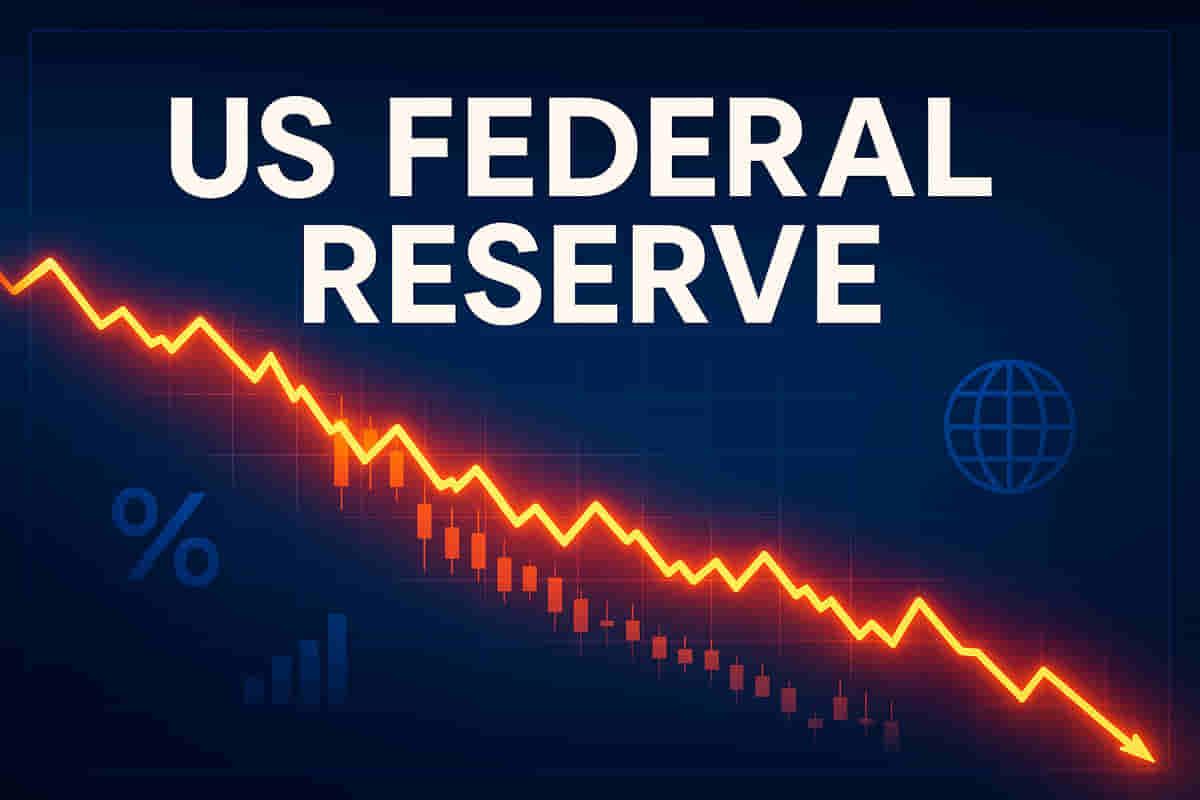US Fed's Hawkish Tone Sparks Selloff, Indian Markets Close Sharply Lower
Economy
|
30th October 2025, 12:14 PM

▶
Stocks Mentioned :
Short Description :
Detailed Coverage :
Indian equity markets closed sharply lower on Thursday, with the BSE Sensex falling 592.67 points to 84,404.46 and the Nifty 50 declining 176.05 points to 25,877.85. The primary trigger for the market selloff was the US Federal Reserve's decision to implement an expected 25 basis point rate cut, accompanied by cautionary remarks from Fed Chair Jerome Powell. Powell's commentary suggested no firm commitment for further rate reductions in December, dampening investor hopes for continued monetary easing and leading to global uncertainty. This resulted in broad-based selling pressure on the BSE, with 2,291 stocks declining against 1,876 advances. Notable decliners on the Nifty 50 included Reliance Industries Limited, State Bank of India, ICICI Bank Limited, InterGlobe Aviation Limited, and Bharti Airtel Limited. Conversely, Coal India Limited, Hindalco Industries Limited, Larsen & Toubro Limited, Bharat Electronics Limited, and Nestle India Limited saw modest gains.
Experts like Abhinav Tiwari of Bonanza and Vinod Nair of Geojit Investments Limited highlighted Powell's remarks as the key reason for the market downturn and consolidation. Vinod Nair noted that the strength in the U.S. dollar following these comments contributed to a risk-off sentiment across emerging markets like India.
Sectoral performance was predominantly weak, with Healthcare, Financials, and Pharma indices dropping around 0.7 percent each. The Nifty Bank fell 0.61 percent, and Nifty Financial Services declined 0.77 percent. The broader markets showed more resilience, with the Nifty Midcap 100 experiencing a minor dip of 0.09 percent. Realty and Energy sectors were the sole gainers, up 0.13 percent and 0.04 percent respectively.
Additional pressure stemmed from renewed selling by foreign institutional investors. Prashanth Tapse of Mehta Equities Ltd. and Ponmudi R of Enrich Money pointed out investor caution due to the unlikelihood of further US Fed rate cuts in the near term and anticipation of US-China trade deal outcomes. A mild weakening of the Indian Rupee against the U.S. dollar also contributed to the cautious sentiment.
In commodities, gold prices traded volatile with mild gains. Jateen Trivedi of LKP Securities expects gold to remain range-bound between ₹1,18,000–₹1,24,500 in the near term. Market participants are now closely watching the outcome of the Trump-Xi meeting in South Korea, with any positive resolution in global trade or fiscal matters potentially helping to stabilize market confidence.
Impact: This news significantly impacts the Indian stock market by causing a broad-based selloff, affecting investor sentiment, currency values, and sectoral performance. The commentary from the US Federal Reserve has direct implications for global and Indian monetary policy expectations and risk appetite. The rating for the impact on the Indian stock market is 8/10.
Difficult Terms: Hawkish Commentary: Remarks or policy positions indicating a preference for tighter monetary policy, such as higher interest rates, to control inflation, which can negatively impact stock markets. Basis Point: A unit of measurement used for interest rates and financial percentages, where one basis point equals 0.01% (1/100th of a percent). Emerging Markets: Countries with developing economies that are experiencing rapid growth and industrialization, often characterized by higher growth potential but also higher risk. Risk-off Sentiment: An investment environment where investors become more cautious and prefer to reduce their exposure to risky assets, moving towards safer investments. Foreign Institutional Investor (FII): An investor from one country that invests in securities or assets in another country. Fiscal Matters: Issues related to government spending, revenue generation (like taxes), and borrowing. Commodities: Raw materials or primary agricultural products that can be bought and sold, such as gold, oil, and agricultural products.